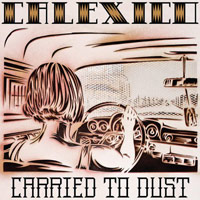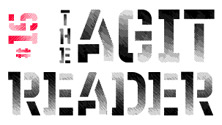
Hungry Saw
Constellation
After a five-year break that, judging from what the band has said, might have turned into an indefinite hiatus, the Tindersticks have returned, but only partially intact. Singer Stuart Staples, multi-instrumentalist David Boulter and guitarist Neil Fraser are all that remain from the band’s original six-piece line-up. But it matters little as they’ve found many helping hands with which to augment their sound.
It matters very little as it were, as the bevy of string and horn players the band recruited for Hungry Saw have contributed to what may very well be the Tindersticks’ finest hour (or at least 45 minutes, given the record’s run time). Staples has always had soul, but until now it’s been the scrawny, pale Brit variety. Here his voice is Barry White big, a sumptuous croon matched to backing perfectly swooning around it. Following an instrumental “Introduction,” “Yesterdays Tomorrows” mixes bluetoned guitars with a swelling of electric organ and horn punctuations. The song is as good as it gets, in the broadest sense, a Stax-style, jukejoint reverie that’s instantly timeless. In contrast, “Come Feel the Sun” is more elegiac, a simple piano line and mournful violin the only counterpoint to Staples’ crimson warble. “The Other Side of the World” works similarly, though more lushly, Staples creating something on the level of a Nina Simone standard. There is so much good on Hungry Saw that it’s hard not to detail it all specifically: the Joe Meek-ed noir of “The Organist Entertains;” the muted gospel rock of “Mother Dears;” the touching denouement of “The Turns We Took.” Not knowing what was missing until it was almost gone, we’ve been graced with a record that fills so many voids.
Stephen Slaybaugh

Swimmer
Partisan
The Standard’s Wire Post to Wire, released in 2004 was a thing of precision and beauty, heightened emotion wound around taut guitar lines and electronic embellishments. While their follow-up, Albatross, put out the following year, like Wire, on Yep Roc, didn’t quite match the exacted balance of thought and execution of its predecessor, it certainly wasn’t what you would call a letdown.
So where the hell has the band been in the interim? “Hell” is the operative word in that query, as the band found itself in the limbo of the precarious music industry when V2 essentially closed up shop before releasing the band’s first record for the label, Swimmer. Singer Tim Putnam finally came to the conclusion of starting his own label, Partisan, so now the album is finally seeing the light of day.
And that’s fortunate because the album retains the compressed unease and vulnerability that’s characterized the Standard’s best work while at the same time expanding upon the band’s sonic vocabulary. While leadoff cut, “The Swimmer” hearkens back to Wire, reverberating guitar chords juxtaposed against a moody backdrop and Putnam’s eviscerating shriek, a good majority of the record favors more natural settings. “Through the Walls” and “Hotel” use piano as their centerpoints, on the former to propel a majestic bout of paranoia and on the latter as the principal accompaniment to a seismic lament. “Lines,” in a similar manner, is buoyed to an acoustic guitar riff, making for a hallowing call from the darkest desert nook. The band hasn’t gone completely organic, though. “Absent Miles” is a fiery fete of synth nodes and jagged (electric) guitar that is just as much an extrapolation on the Standard standard as anything else on the album. The band has once again proven itself a gem in the overcrowded indie rock world, and it’s good that we didn’t lose them.
Stephen Slaybaugh
MP3: “The Swimmer”

War Tapes ep
Sarathan
In 30 years, someone will care enough about the current crop of Cure emulators to throw together a compilation package, ala Nuggets, that captures a (hopefully) longed for essence. Future teenagers will look to this compilation the same way kids in the early aughts dug on the Sonics or the Dovers for inspiration. War Tapes will fit right in, perhaps the Chocolate Watchband to the Cure’s Seeds. The deep, breathy vocals of the Strokes, Interpol’s rhythm section, the Killers’ keyboards, the Bravery’s atmosphere, the pensive lead guitar from Disintegration-era Cure—it’s all woven together on this self-titled seven-song EP. This is an overwhelming amount of influence to squish into a new band’s first outing, and War Tapes manage to deftly fit them all in. At the same time, melding those crystalline post-Grunge sounds together only makes sense in that none of them are all that different from each other. Ten years ago, this would have been just another throw away, post-emo, indie rock band. But with the Urban Outfitted MTV2 generation dictating the current market with their disposable college loan cash, War Tapes need only keep looking cute and churning out this aesthetic for their careers to blossom into Cribs episodes. Sometimes it pays to not be forward looking. Sometimes the consumer just wants to go with what they already know. Sometimes, for a band, it is just much easier to plug in a decrescendo straight off of Turn On the Bright Lights or to just keep bashing on that ride cymbal like Fab Moretti instead of laboring over originality. War Tapes make no bones about their influences and ultimately will benefit from their ability to channel them. This band will graduate from the opening slot soon and move to top-billing, perhaps even a song on the Spiderman 4 soundtrack, maybe even Transformers 2. But will this be the sound that our grandkids remember us by?
Michael P. O’Shaughnessy

Carried to Dust
Quarterstick
For more than a decade, Calexico have been painting a unique musical landscape from a palette of Southwestern tones. Divining a blend of folk rock sounds that borrows from mariachi, Sergio Leone technicolor motifs and East L.A. lore, the duo of Joey Burns and John Convertino have taken to a path that only they seem to know.
Carried to Dust, the band’s sixth longplayer, continues in this tradition, never straying from the band’s chosen terrain. This turns out, at this point, to be both a positive and a negative. While the band’s music has a flavor unlike any other, one wants something else after a while. We’ve heard the surf rhumba of “El Gatillo (Trigger Revisited)” before, and the desert folk of “The News About William,” “Man Made Lake” and “Bend to the Road” all begins to muddle together after a few listens. What works better—or at least stands out—is when Calexio get ambient. Suitable of its name, “Inspiración” puts some sultry Spanish vocals to a carnival beat and otherworldly horns for a funky serenade. “Two Silver Trees” is also awash in idiosyncratic instrumentation, elevating an otherwise innocuous cut. But the exceptions to the rule are not enough, and Calexico’s downfall is ultimately its own trappings.
Stephen Slaybaugh
ALBUM REVIEWS
Michael Franti & Spearhead, All Rebel Rockers
Master Slash Slave, Scandal
Ten Kens, Ten Kens
Damien Jurado, Caught in the Trees
Chad VanGaalen, Soft Airplane
UNKLE, End Titles... Stories for Films
Player/Kommander, On the Eve of Absolute Get Down
Duchess Says, Anthologie Des 3 Perchoirs
Waves on Waves, Waves on Waves
Prisonshake, Dirty Moons
Heavy Heavy Low Low, Turtle Nipple and the Toxic Shark
Toadies, No Deliverance
Death Vessel, Nothing Is Precious Enough For Us
Brothers and Sisters, Fortunately
